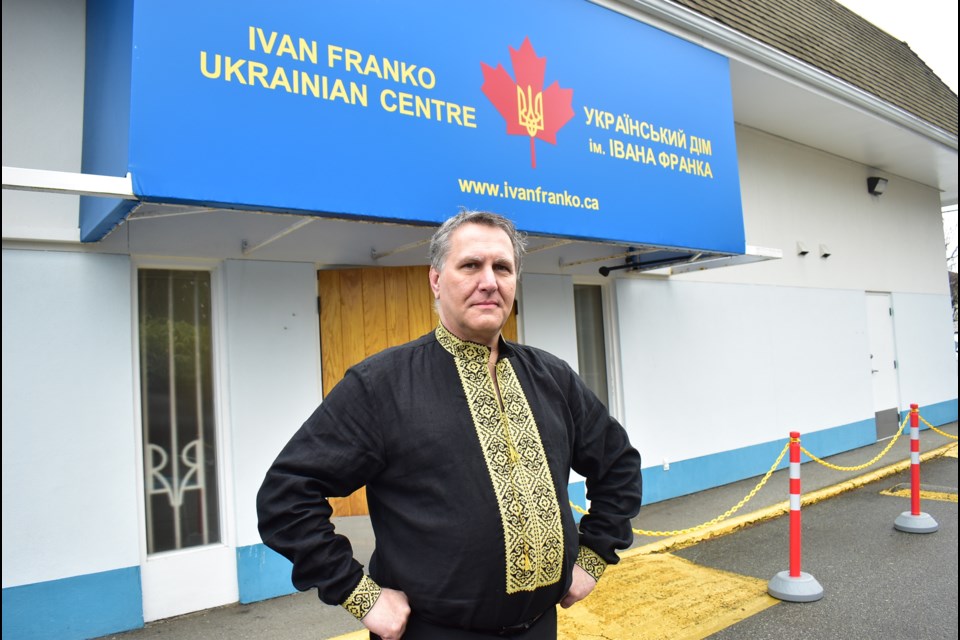Like many people around the world, Eugene Lupynis watched and listened in disbelief Wednesday night as Russian leader Vladimir Putin issued a declaration of war against neighbouring Ukraine.
Within seconds, Richmond resident Lupynis – who’s on the board of the Richmond-based Ukrainian Community Society of Ivan Franko – switched his TV over to a 24-hour news channel to learn of seemingly unprovoked missile strikes on the country of his heritage.
Lupynis spent several hours glued to the news until the early hours of Thursday, watching and worrying for the safety of loved ones in Ukraine.
On Thursday morning, the first thing he did was call those relatives to check on them and find out first-hand what was happening, as thousands of Russian troops began their invasion over Ukraine’s eastern, southern and northern borders.
“Most of (my relatives) are in the west of the country, quite close to Poland. They haven’t see any damage yet,” Lupynis told the Richmond News.
“I have some in the capital (Kyiv) as well, but we haven’t heard from them yet. I’m told by other relatives that the ones in Kyiv are taking shelter.
“Nobody’s fleeing that we know of. Family members said that, if the war comes to their city, they will stay and defend it.”
Russian community heartbroken by invasion
Meanwhile, a prominent member of Richmond’s Russian community, Anna Vavilova, founder of Steveston-based World of Music and Arts, told the News that she was “heartbroken” to learn of the war starting.
Vavilova said she, too, has relatives in Ukraine’s capital, who she speaks to daily, and that she feels “sick” to her stomach.
Lupynis also spoke of the feeling of “utter helplessness” as he watched the pictures and video rolling in of the Russian invasion.
“I’m in total disbelief that, here we are in 2022, and we’re having one nation thinking it’s OK to invade a free nation,” he said.
“The hard thing for most of us is watching the fact that Ukraine is essentially on its own. The West has issued sanctions, for which the people of Ukraine is thankful for.
“But they take time and Russia were warned about it, so it gave Putin an opportunity to prepare and they clearly had no deterrent anyway.”
Ukrainian community pleads for NATO to get involved
Lupynis said the West needs to get involved, but added that “Quite honestly, I think it’s too late anyway. But I would still prefer they come to Ukraine’s defence.”
In his war cry Wednesday night, Putin issued a thinly veiled threat to the West and NATO not to get involved or it would suffer the consequences.
“That part was also terrifying. The world does not know what he’s going to do,” said Lupynis.
“It’s not going to end at Ukraine. It’s a stepping stone. This could escalate into a larger European and global conflict.”
According to global news agencies, Russia launched a full-scale invasion of Ukraine on Wednesday night (Pacific Time), unleashing airstrikes on cities and military bases and sending troops and tanks from multiple directions.
Ukrainian officials said their forces were battling Russians on a multiple fronts, and had lost control of the decommissioned Chernobyl nuclear power plant, scene of the world's worst nuclear disaster.
“Russia has embarked on a path of evil, but Ukraine is defending itself and won’t give up its freedom,” Ukrainian President Volodymyr Zelenskyy tweeted.
“It wasn’t Ukraine that chose the path of war, but Ukraine is offering to go back to the path of peace.”
Zelenskyy, who earlier cut diplomatic ties with Moscow and declared martial law, described Russian forces advancing on a series fronts, including Kharkiv, Ukraine’s second-largest city, just over 20 kilometres away from the eastern border with Russia.
He appealed to global leaders, saying that “if you don’t help us now, if you fail to offer a powerful assistance to Ukraine, tomorrow the war will knock on your door.”
Why did Russia invade Ukraine?
Moments before the invasion began, President Putin went on TV declaring that Russia could not feel "safe, develop and exist" because of what he called a constant threat from modern Ukraine.
He claimed his goal was to protect people subjected to bullying and genocide and aim for the "demilitarisation and de-Nazification" of Ukraine.
However, there has been no genocide in Ukraine - it is a vibrant democracy led by a president who is Jewish.
President Putin has frequently accused Ukraine of being taken over by extremists, ever since its pro-Russian president, Viktor Yanukovych, was ousted in 2014 after months of protests against his rule.
Russia then retaliated by seizing the southern region of Crimea and triggering a rebellion in the east, backing separatists who have fought Ukrainian forces in a war that has claimed 14,000 lives.
Late in 2021 he began deploying big numbers of Russian troops close to Ukraine's borders.
Then this week he scrapped a 2015 peace deal for the east and recognised areas under rebel control as independent.
Russia has long resisted Ukraine's move towards the European Union and the West's defensive military alliance NATO.
Announcing Russia's invasion, he accused NATO of threatening "our historic future as a nation".
With files from the Associated Press



